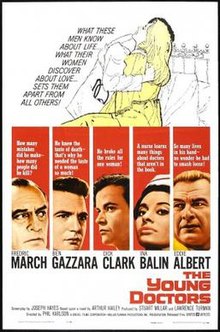The Young Doctors (film)
| The Young Doctors | |
|---|---|
 | |
| Directed by | Phil Karlson |
| Written by | Joseph Hayes |
| Based on | novel "The Final Diagnosis" by Arthur Hailey |
| Produced by | Stuart Millar Lawrence Turman |
| Starring | Fredric March Ben Gazzara Dick Clark Ina Balin Eddie Albert |
| Cinematography | Arthur J. Ornitz |
| Edited by | Robert Swink |
| Music by | Elmer Bernstein |
| Distributed by | United Artists |
Release date |
|
Running time | 100 minutes |
| Country | United States |
| Language | English |
| Budget | just over $1 million[1] |
| Box office | $1.5 million[2] |
The Young Doctors is a 1961 American drama film directed by Phil Karlson and starring Ben Gazzara, Fredric March, Dick Clark, Ina Balin, Eddie Albert, Phyllis Love, Aline MacMahon, George Segal, and Dolph Sweet.
The film is based on the 1959 novel The Final Diagnosis by Arthur Hailey. Ronald Reagan was the narrator in the film.
Plot
[edit]David Coleman (Ben Gazzara) is a young doctor hired by a hospital's pathology department. The head of the department, Dr. Joseph Pearson (Fredric March), sees Coleman as a rival, and they fight over many medical issues. Coleman falls in love with Cathy Hunt (Ina Balin), a student nurse at the hospital, who develops a tumor in her knee. Pearson believes that the tumor is malignant and that the leg should be amputated, but Coleman disagrees. Coleman orders three blood tests on Mrs. Alexander (Phyllis Love), an expectant mother whose baby may have hemolytic disease, but Pearson believes that the tests are excessive and cancels the third test. Mrs. Alexander is married to a young intern at the hospital (Dick Clark), who, along with Coleman, tried to push for the third test. When the baby is born seriously ill, Dr. Charles Dornberger (Eddie Albert), Mrs. Alexander's OB/GYN, berates Pearson and conducts a blood transfusion to save the baby's life. Pearson's future at the hospital becomes uncertain, and he resigns. Coleman has changed his mind about Cathy's tumor and agrees with Pearson's decision, while Pearson says that Coleman reminds him of himself when he was young and urges him not to let hospital bureaucracy wear him down.
Cast
[edit]- Fredric March as Dr. Joseph Pearson
- Ben Gazzara as Dr. David Coleman
- Dick Clark as Dr. Alexander
- Ina Balin as Cathy Hunt
- Eddie Albert as Dr. Charles Dornberger
- Phyllis Love as Mrs. Elizabeth Alexander
- Edward Andrews as Jim Bannister
- Aline MacMahon as Dr. Lucy Grainger
- Arthur Hill as Tomaselli
- Rosemary Murphy as Miss Graves
- Barnard Hughes as Dr. O'Donnell
- George Segal as Dr. Howard
- Dolph Sweet as Police Car Driver
No Deadly Medicine and The Final Diagnosis
[edit]Arthur Hailey wrote a two part television play for Studio One called "No Deadly Medicine". It was broadcast in 1957 starring Lee J. Cobb, William Shatner and James Broderick.[3]
Doubleday commissioned Hailey to adapt the script into a novel, The Final Diagnosis, published in 1959. "The quality remains high", wrote The New York Times.[4]
Production
[edit]Film rights were bought by Dick Clark, then best known for Bandstand who took the project to the producing team of Laurence Turman and Steve Tillman (it was their first film together). Finance was obtained from United Artists.[1]
Jeffrey Hunter was sought for the lead.[5] Phil Karlson who had just been fired off The Secret Ways agreed to direct.[6]
Filming started on January 9, 1961.[7] Filming took two months, with studio work at the Production Centre, location work at Poughkeepsie and exteriors shot at Vassar Brothers Hospital. Many of the cast were taken from the New York stage.[1]
The movie was made with the co operation and approval of the American Medical Association.[8]
References
[edit]- ^ a b c H. T. (January 29, 1961). "Case History: 'Young Doctors' in New York". The New York Times. ProQuest 115340131.
- ^ "1961 Rentals and Potential". Variety. 10 January 1961. p. 58.
- ^ V. A. (November 15, 1957). "Lee Cobb to Star in Play on C.B.S.". The New York Times. ProQuest 114315941.
- ^ Fuller, E. (September 20, 1959). "Hospital microcosm". The New York Times. ProQuest 114647097.
- ^ Hopper, H. (September 29, 1960). "Seek jeff hunter for 'the young doctors'". Chicago Daily Tribune. ProQuest 182584868.
- ^ Scheuer, P. K. (October 14, 1960). "Karlson to direct march, dick clark". Los Angeles Times. ProQuest 167750745.
- ^ "Of Local Origin". The New York Times. December 2, 1960. ProQuest 115100389.
- ^ Hopper, H. (June 23, 1961). "Entertainment". Los Angeles Times. ProQuest 167888643.
External links
[edit]- 1961 films
- 1961 drama films
- American drama films
- American black-and-white films
- 1960s English-language films
- Films about physicians
- Films about surgeons
- Films scored by Elmer Bernstein
- Films directed by Phil Karlson
- Films produced by Lawrence Turman
- Films based on Canadian novels
- Films set in hospitals
- United Artists films
- Films based on works by Arthur Hailey
- 1960s American films
